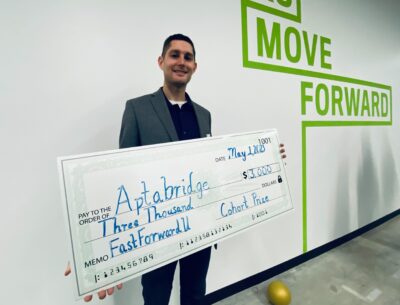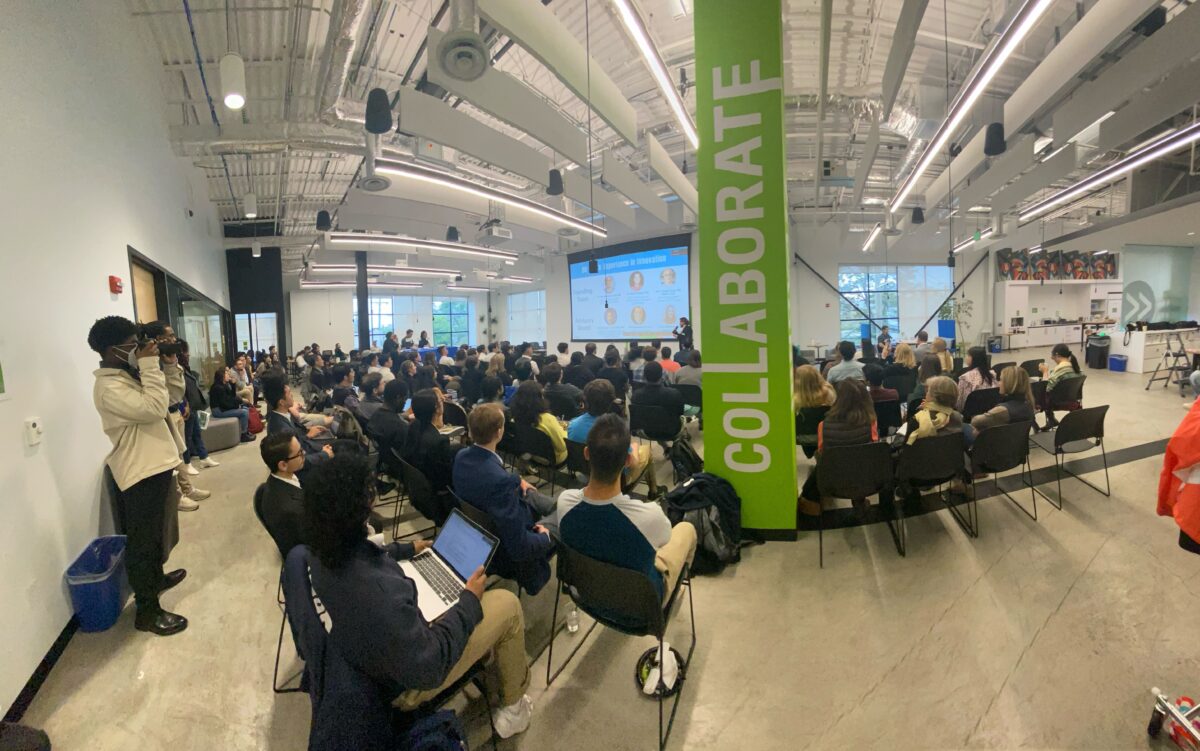As part of Johns Hopkins University’s (JHU) mission to support and empower creators, change-makers, entrepreneurs and innovators, student entrepreneurs in a Johns Hopkins Technology Ventures program competed for a top prize on Monday night, showcasing innovations such as AI-driven personal styling and medical devices.
According to an email to Technical.ly, nine teams at the FastForward U Fuel Demo Day received a $5,000 stipend grant after a semester of rigorous accelerator engagement. The teams ranged from undergrad to Ph.D. students across the university’s various schools and departments.
Josh Ambrose, JHU’s director of student ventures, connected this cohort’s accomplishments with the broader entrepreneurial ecosystem at the top-tier university.
“We’re proud of our student entrepreneurs and excited for how student entrepreneurship is not just sustaining itself, but thriving at Johns Hopkins University,” he said.
Three additional awards were presented along with the baseline grants, which totaled $45,000.

Ph.D. candidate W. Taylor Cottle holds the $3K Cohort Prize check. (Courtesy photo)
The $3,000 Cohort Prize was awarded to Aptabridge, led by JHU School of Medicine (SOM) Ph.D. candidate W. Taylor Cottle. The $5,000 Audience Choice award went to MagGenix, headed by a group of senior undergrads from the biomedical engineering program, including Joshua Devier.
ThermoBeat, represented by senior undergrad Will Blair from Krieger School of Arts and Sciences (KSAS), earned the $12,000 Grand Prize. The winner was decided by a panel of judges who are or were also successful student entrepreneurs in their respective companies; they included Ellington West, CEO and cofounder of Sonavi Labs; Kevin Carter, Head of Business Development at EcoMap Technologies; Ellis Singer McCue, CEO at Territory Foods; and Romi Bhatia, Senior Finance & Investment Advisor at USAID.
All financial support was nondilutive and had no strings attached, thanks to the alumni support from the Ganz Foundation and Migliara Family Foundation in Miami, Florida and Owings Mills, Maryland, respectively.
Ambrose added that isn’t the end of JHU’s entrepreneurial showcases this week or month. Students and entrepreneurs involved in the Carey Business School Student Venture Showcase (May 5), Nucleate Baltimore’s Final Pitch Showcase (May 11) and Social Innovation Lab’s Innovators Showcase (May 18) will exhibit and pitch throughout the month.”
“It’s an incredible amount of activity and growth happening from all over campus, grounded here in Baltimore — a great startup city,” Ambrose said.
Meet the Spring 2023 Fuel Teams
- MagGenix (Whiting School of Engineering, or WSE): developing a magnetogenetic cell therapy platform
- Release Therapeutics (WSE): a preclinical startup venture focused on developing drug delivery solutions to areas of unmet clinical need in ENT surgery.
- AptaBridge (SOM): creating next-generation immunotherapy molecules that leverage DNA nanoparticles to modulate the human immune system and fight cancer.
- AuthFind (Carey): utilizes machine learning, AI, and blockchain to streamline insurance prior authorization workflows and reduce processing times.
- JJ Innovative Materials (WSE): carbon capture and storage technology, focusing on the construction materials industry, with a first product of hemp board built with hempcrete.
- Maine Bee (KSAS): FDA-approved and biology-inspired encapsulation methods that make it possible to infuse culinary ingredients with nutraceuticals and plant nutrition.
- The Impact Stylist (Carey): an AI-driven personal styling service curated with sustainably made clothing.
- Master Wheel (WSE): cross-platform dual pedal gaming controller for pediatric patients who need to rehabilitate their foot and/or ankle to regain strength and mobility.
- ThermoBeat (KSAS): harnesses the thermal energy of the body to power medical devices and uses machine learning to predict cardiac disorders.
Before you go...
Please consider supporting Technical.ly to keep our independent journalism strong. Unlike most business-focused media outlets, we don’t have a paywall. Instead, we count on your personal and organizational support.
3 ways to support our work:- Contribute to the Journalism Fund. Charitable giving ensures our information remains free and accessible for residents to discover workforce programs and entrepreneurship pathways. This includes philanthropic grants and individual tax-deductible donations from readers like you.
- Use our Preferred Partners. Our directory of vetted providers offers high-quality recommendations for services our readers need, and each referral supports our journalism.
- Use our services. If you need entrepreneurs and tech leaders to buy your services, are seeking technologists to hire or want more professionals to know about your ecosystem, Technical.ly has the biggest and most engaged audience in the mid-Atlantic. We help companies tell their stories and answer big questions to meet and serve our community.
Join our growing Slack community
Join 5,000 tech professionals and entrepreneurs in our community Slack today!

The person charged in the UnitedHealthcare CEO shooting had a ton of tech connections

From rejection to innovation: How I built a tool to beat AI hiring algorithms at their own game

Where are the country’s most vibrant tech and startup communities?



